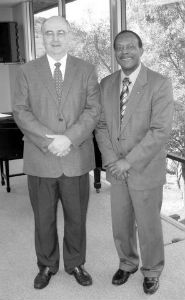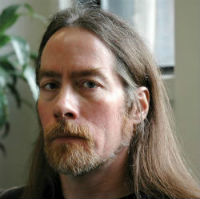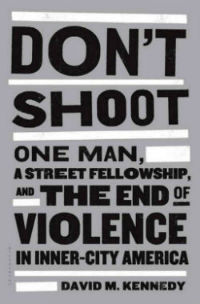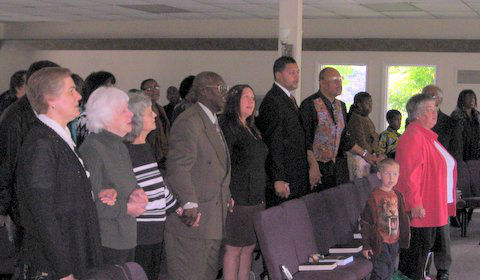 From left: Neil Earle and Curtis May
From left: Neil Earle and Curtis MayBy Neil Earle
 From left: Neil Earle and Curtis May
From left: Neil Earle and Curtis MayOur Glendora church supports the efforts of Pastor Curtis May at the para-church ministry known as ORM, Office of Reconciliation and Mediation in effective operation since 1996.
The recent turmoil in Ferguson, Missouri brought some sad ironies to light for those of us involved in the frustrating quest for racial sanity in this country. The sight of protestors holding their hands in the air and chanting “Don’t Shoot” conjured up vivid memories of Pastor May’s message to our congregation on February 4, 2013. He reported on ORM’s participation at a Reconciliation and Police Legitimacy Summit hosted by the United States Department of Justice. The conference was held in Washington, D.C. that January. The event was sponsored by the Director of Community Oriented Policing Services (COPS), former Pasadena police chief Bernard Melekian, a long-time friend of ORM.
Curtis introduced us to the work and writings of David Kennedy, Professor of Criminal Justice at New York’s John Jay College. But Kennedy is no ivory tower academic. He let his hair grow long and got down on the street level with his fellow officers in Boston, Cincinnati and other cities and learned the benefits of localized community-based policing. His book “Don’t Shoot” would be a welcome addition to many school and city libraries. His work in the ghettos uncovered – among other things – a surprising degree of civility and people determined to carry on with normal life in neighborhoods where you might not expect such level-headedness to prevail.
The problems are not hopeless, he asserts.
 David Kennedy
David Kennedy
Though he has his critics, Kennedy sees both sides of the issue very clearly. ORM respects his work because it is a multi-ethnic body that tries to look beyond the incendiary positions that arise out of high-profile racial incidents. As a Christian-rooted organization ORM understands the complexity of issues where some indications of criminality and resisting arrest exist. We see in the Gospels that while Jesus verbally protested his illegal arrest in the Garden of Gethasamane he did not retaliate in kind or use the sword his disciples were so eager to brandish.
In some cases, extremism and quick media responses are a complication that works against sound thinking in racial controversies. The long-established background factors such as unemployment, suspicion, lingering Jim Crow attitudes are always there, of course, and this is where an ounce of prevention is worth a pound of cure. Kennedy reported to COPS that many ethnic groups “believe that the laws set up by the government are slanted against communities of color. Whether true or not this belief is acted upon and helps perpetuate our present conditions.”
Chicago’s police superintendent Garry McCarthy agreed. He added that these facts need to be recognized: “recognition is the first step to finding the cure.”
“In many American cities the community and the police are simply at odds,“ Curtis May told our church.
 Interracial service in Glendora.
Interracial service in Glendora.What seems obvious is not to wait for the next eruption of trouble to reach for band-aid solutions. Troubles are accentuated by the troublemakers. “The wrath of man works not the righteousness of God.” Some pointed out how black storeowners were among those victimized in Ferguson while one historian noted how he knew no examples of Martin Luther King – who “wrote the book” on non-violent protest – leading marches at night.
There were and are things to learn from these tense situations before the “professional ambulance chasers” dominate the reaction. Prevention is indeed better than cure and education and civic sensitivity needs to be stressed as the New York Police Department recognized about the recent “choking” incident. They committed to stepped up sensitivity training for their 35,000 force.
How can we say that this will work?
Back in 2005-06 COPS Director Melekian, with the help of ORM, the Western Justice Center, and other agencies, launched a community-oriented “Days of Dialogue” in Pasadena, CA. This pioneering event helped bring together 30 gang members and about 40 police officers in a significant day of learning and interaction for all. The police came in civvies and gang members were promised immunity. “Eighty percent of complaints about police misconduct are about perceived attitudes and misunderstandings,” Chief Melekian stated at that time.
In Washington he bluntly told the assembled delegates that this crisis has become a matter of “restoring public trust” between the police and the community. Activists from Operation Safe Cities in Chicago, Operation Cease Fire in Boston and individual community leaders from other parts of America agreed. Superintendent McCarthy commented that this rift between ethnic groups and the law “is rooted in the history of this country. The most visible form of government in most places is the police force.”
Kennedy presses the point home forcefully. There has been a movement from overt Jim Cow laws (separate drinking fountains, etc.) to constant harassment, according to David Kennedy. In “Don’t Shoot!” he cites the case of one young black man named Timothy who was assigned 21 traffic charges in less than 1½ years. Timothy was eventually shot and killed for bolting from his car after yet another arrest. Kennedy mentions “new tools of intimidation” such as draconian drug laws with 15 year “mandatory minimums,” unrealistic penalties and the slow privatizing of the prison system – “the prison industrial complex.” These are some of the deep-rooted realities that spill over into such quiet scandals as financial profitability accruing to keeping people locked up.
In Washington, Curtis May spoke to about 100 police officers, youth leaders, and pastors on January 10 about “the Dream of Jesus,” his message of concern for the poor, deliverance for the captives, setting at liberty the oppressed – worthy goals any society benefits from embracing (Luke 4:16-18). Himself a victim of police oppression, Pastor May praised the efforts of a new breed of law enforcement officials – the police chief of New Haven, CT, and Captain Josh Ederheimer of the Metropolitan Washington Narcotics Investigative Unit and the inevitable David Kennedy.
Now is the time to learn better techniques of law enforcement. There is hope. Some are seeing all sides involved in these tragic eruptions. ”No officer leaves for duty in the morning and wants to be involved in an incident that will scar his reputation and cost his city millions of dollars in legal costs,” Chief Melekian concluded. Bernard Melekian and his colleagues in COPS see how the attitude of empathy for all involved – including most especially the families of the slain – is the first necessary step in transforming inner city police work and to keep justice rolling on like a river. (Be sure to visit atimetoreconcile.org.)